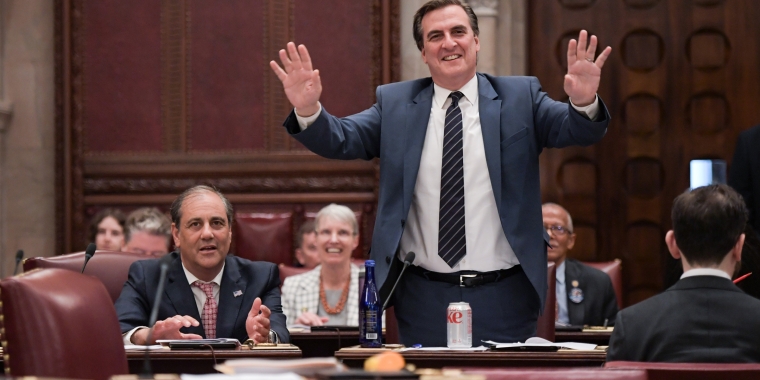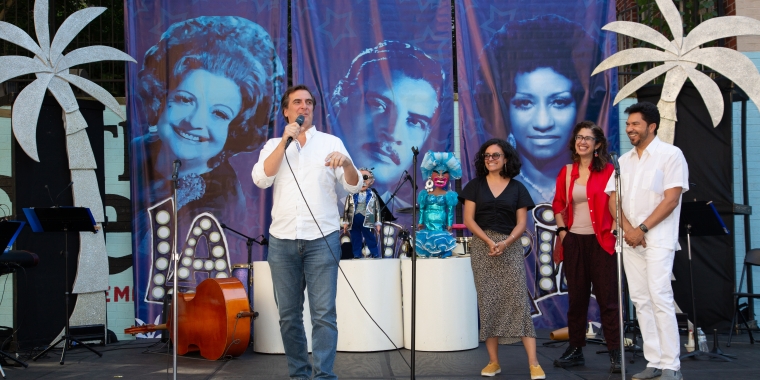
Senate Deputy Leader Gianaris Announces Senate Unanimously Passes Widely-Supported Legislation Expanding Recognition Of Middle Eastern, North African Individuals In State Data
June 9, 2023

Under Current Law, Data Collected About Middle Eastern and North African Communities Labels These Individuals as “White”
Gianaris Bill Creates New Categories for 500,000+ Middle Eastern and North African New Yorkers to More Accurately Depict their Ethnic Heritage and Giving NYS Ability to Better Provide Services and Resources
ALBANY, N.Y. – Senate Deputy Leader Michael Gianaris announced the State Senate unanimously passed his legislation (S.6584-A) to disaggregate data for Middle Eastern and North African (MENA) New Yorkers, giving these communities a stronger voice in state-collected data. Companion legislation is carried by Assembly Member Jessica Gonzalez-Rojas in the State Assembly. A coalition advocating for the legislation was led by MALIKAH, NY Muslim Organizing Collective, Street Vendor Project, Armenian American Action Network, CACF, CAIR-NY, Women’s Empowerment Coalition of NYC, YAMA Action, Engage Action, and others.
“Miscategorizing a New Yorker’s race is not only offensive but has real-world impacts on services and resources particular communities receive,” said Senate Deputy Leader Michael Gianaris. “It should be obvious that people from the Middle East or North Africa are not white, yet that is how our laws define them. I am proud we are passing this legislation because it will give stronger representation and a more powerful voice to so many.”
“It’s past time that state agencies that collect certain demographic data make new categories for Middle Eastern and North African groups,” said Assembly Member Jessica González-Rojas. “It’s unconscionable that Middle Eastern and North African New Yorkers are still counted as “White” in most demographic data. With this bill, New York could finally have a more accurate representation of Arab Americans, and subsequently better serve the Arab American community. Thank you to all of the advocates and Deputy Majority Leader Giannaris for your leadership on getting this important bill passed in the Senate. I’m proud to sponsor this bill in the Assembly and call on my colleagues on the Assembly side to follow the Senate’s lead so the Governor can sign the bill into law.”
Individuals of MENA descent are aggregated into the collective term “White” along with people of European descent for purposes of demographic data collection in New York. MENA communities across New York State remain underserved, exhibiting higher rates of language access needs, housing insecurity, poverty, domestic abuse, and health disparities. Businesses and organizations that primarily serve these communities struggle to receive equity-based aid because those they serve are classified as white. MENA individuals are historically undercounted in the U.S. Census for this reason, with the federal government projecting about 280,000 MENA New Yorkers – but community leaders and demographic experts projecting more than 500,000.
This can have a direct impact on New Yorkers – such as when a small business is applying for MWBE contactor status, they can be denied because they would be demographically included as “White.”
President Obama took similar measures federally in 2015, only to have them rescinded by subsequent administrations. This bill also follows in the footsteps of legislation disaggregating the Asian American and Native Hawaiian/Pacific Islander demographic that was signed into New York law in 2021.
Rana Abdelhamid, Executive Director of MALIKAH and Astoria local/resident said, “Growing up and organizing in NY as a North African person, I have seen first-hand the negative impact of lack of data on our communities’ health, education and small businesses, especially during crises like the pandemic. North African and Middle Eastern people have been invisible in data at the federal, state and local levels. This bill is a historic moment for our communities that allows, for the first time ever, will allow our communities to be seen in state collected data. We’re grateful for Senate Deputy Leader Gianaris and Assemblymember Gonzalez-Rojas for helping us fight against the data erasure of our working-class immigrant communities.”
Suzie Abajian, Co-Director, Armenian-American Action Network said, “For too long, MENA populations, like Armenian Americans, have been invisible within federal, state and local data. This lack of visibility has had direct and material consequences on people's lives including their healthcare, education, employment and anti-discrimination efforts. When there is no data, there is no way of tracking opportunity gaps and remedying inequities.”
Mohamed Attia, Egyptian-American and Lead Organizer with NY Muslim Organizing Collective said, “For many years our North African community has not been counted and not been recognized as it's own identity, and that has a lot of implications on our people. Starting with lack of investment in services provided for us, to barring our communities from accessing resources and opportunities they deserve as a minority group. It's exciting to see NYS stepping up to recognize our community as a separate race from "White", and hoping that the whole nation will follow through.”
Lloyd Feng, Special Projects Policy Coordinator and Campaign Lead of Invisible No More, Coalition for Asian American Children and Families (CACF) said, “CACF’s Invisible No More Campaign is proud to support the NYS MENA Data Disaggregation bill that builds on the historic Asian American, Native Hawaiian, and Pacific Islander data disaggregation law that we successfully advocated for in 2021. From the beginning of the campaign for AANHPI data disaggregation, MENA-serving community groups have fought alongside us on behalf of our most marginalized. Likewise, we are ready to uplift MENA communities’ long overdue need for representation and visibility in government data collection, and stand together to fight for equity in data disaggregation.”
Somia Elrowmeim, Yemeni-American and Executive Director and founder of the Women’s Empowerment Coalition of NYC said, “MENA data disaggregation is an act of power building which helps amplify the voices of diverse communities such as Egyptians, Yemenis, Moroccans, Algerians, Syrians and many more. For too long, our communities have been overlooked and it's time for us to be and feel seen and represented.”
Youssef Mubarez, YAMA Action President said, “YAMA Action, on behalf of the Yemeni American community of NY, would like to thank the Senate for passing bill S.6564-A. Your vote acknowledges the need for change and exhibits a profound understanding of the importance of specificity in data collection. With this action, you have directly addressed the under-representation of our communities, setting the stage for more accurate resource allocation, improved social services, and informed policy decisions. The work done by all the organizers to get here is unprecedented and will change the future of our communities forever.”
Abier Rayan, Girl Scouts Astoria Troop Leader said, “My name is Abier Rayan I am both a Troop Leader of Girl Scouts of Astoria and a staff member of the Girl Scouts of Greater New York. This bill is important to me because we need recognition for all the people in our community. We work hard and are tax payers who raise their kids to be proud of their identitys. We know that our money should go back into our community’s but that isn’t the case when we aren’t categorized correctly. We need to pass this bill to gain empowerment through our Community along with gaining recognition for all of our hard work.”
CAIR New York Legal Director Ahmed Mohamed said, “CAIR New York welcomes the recent Senate passage of S6584A, a pivotal bill that mandates state agencies to adopt separate demographic collection categories for White, Middle Eastern, and North African New Yorkers. This legislation represents a critical step towards acknowledging and embracing the rich diversity of New Yorkers with MENA backgrounds. The bill will empower decision makers with a better understanding of MENA communities and provide future opportunities to remedy inequities. We urge the Assembly to expeditiously address this bill and swiftly deliver it to Governor Hochul's desk, ensuring its prompt enactment.”
Community Activist Saubirah Hack said, “This is the first step towards achieving equity for our Middle Eastern & North African (MENA) brothers and sisters. Demographic data has historically been collected without these communities in mind, which has led to disparities in resource allocation and funding for small businesses and community organizations. This legislation will help ensure we close this gap. We commend Senate Deputy Leader Michael Gianaris for his leadership on this issue and urge our representatives in the State Assembly to stand with the MENA communities by supporting this bill.”
Share this Article or Press Release
Newsroom
Go to Newsroom


